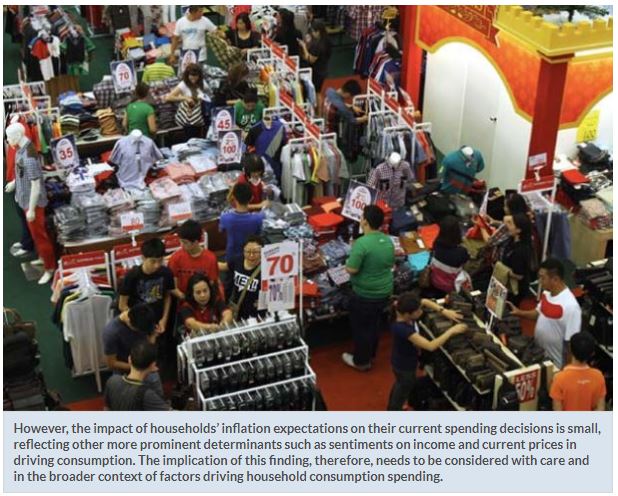Inflation expectations of Malaysian households
PETALING JAYA: Inflation expectations matter because they affect key economic and financial variables such as actual inflation, wage, spending and financial asset valuations.
Looking specifically at inflation expectations of households in Malaysia, households form their inflation expectations by considering both backward and forward-looking factors, such as recent shopping experiences and current income levels, as well as the future outlook of the domestic economy.
Nevertheless, inflation expectations differ across households, given the different compositions, priorities and experiences, Bank Negara said in its 2018 annual report. Certain demographic groups that typically experience higher cost of living burden, such as lower-income and large households, tend to display higher inflation expectations.
As commonly experienced by other countries, there is evidence of a wedge between households’ inflation expectations and actual inflation out turns.
This reflects households’ broad inattention to inflation, varied information sets used to gain information about inflation, different consumption patterns, as well as unanticipated shocks to the economy.
However, the impact of households’ inflation expectations on their current spending decisions is small, reflecting other more prominent determinants such as sentiments on income and current prices in driving consumption.
The implication of this finding, therefore, needs to be considered with care and in the broader context of factors driving household consumption spending.
Separately from consumption, higher inflation expectations could result in higher actual future inflation if they become entrenched, whereby one round of price increase triggers further rounds as inflationary psychology takes hold.
As such, it is important for central banks to place focus on ensuring that these expectations are stable and anchored, rather than engineering higher expectations to meet short-term economic goals.
This goes back to the need for having a solid understanding of how households form inflation expectations, in order for any expectation anchoring strategies to be effective.
To gain a complete understanding of the impact of inflation expectations on the Malaysian economy, inflation expectations of firms and financial markets should also be assessed in order to obtain a comprehensive picture that includes insights on price- and wage-setting decisions, as well as financial market valuations.
As ruminated by Bank Negara’s second governor, Tan Sri Abdul Aziz Taha: “Once businessmen and consumers discern an absence of will by the authorities to resist inflation, their expectations of rising inflation will be strengthened and they begin to act in a way that will make these expectations self-fulfilling.”
Today, this statement remains highly relevant. For central banks, continuous research on the drivers of inflation expectations, clarity in communication and educational pursuit in addressing inattention to inflation – from the concept of inflation to the technicalities of its formulation – will go a long way in preventing the unhinging of inflation expectations.
Source: https://www.thestar.com.my/business/business-news/2019/03/28/inflation-expectations-of-malaysian-households/#y3ylqIP5CUBlJrDr.99


 English
English




